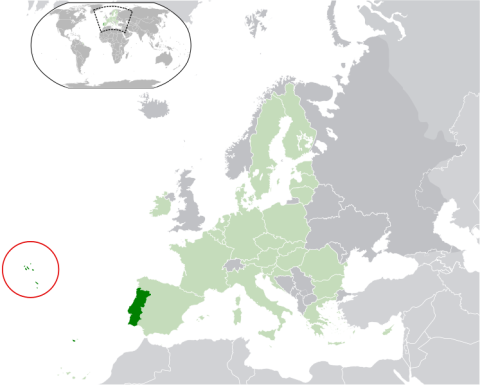[1] Igitur sānctus pater cum suā familiā per aequora ōceanī hūc atque illūc agitābātur per trēs mēnsēs. [2] Nihil poterant vidēre nisi caelum et mare. Reficiēbant semper per biduānum aut trīduānum. [3] Quādam vērō diē, appāruit illīs īnsula nōn longē. Cum appropinquāssent ad lītus, trāxit illōs ventus in partem; [4] et ita per quadrāgintā diēs nāvigābant per īnsulae circuitum, nec poterant portum invenīre. [5] Frātrēs vērō quī in nāvī erant coepērunt Dominum dēprecārī cum flētū, ut illīs adiūtōrium praestōlāsset: vīrēs enim eōrum, prae nimiā lassitūdine, paene dēfēcērunt.
[6] Cum autem permānsissent in crēbrīs ōrātiōnibus per trīduānum et in abstinentiā, appāruit illīs portus angustus—tantum unīus navis receptiō—et appāruērunt illīs duo fontēs ibīdem, ūnus turbidus et alter clārus. [7] Porrō frātrēs festīnābant cum vāsculīs ad hauriendam aquam. Intuēns vir Deī illōs ait: [8] “Fīliolī, nōlīte peragere illicitam rem sine licentiā seniōrum quī in hāc īnsulā commorantur. [9] Tribuent namque vōbīs hās aquās spontāneē, quās modo vultis fūrtim bibere.”
notes
The Island of the Community of Ailbe (see 12.74 for the name). They sail for three months (if the manuscript here is correct) and get close to an island, but cannot land for forty days. When they finally make it to land they find two wells, one with dirty water and one with clear. The monks want to drink, but Brendan tells them to wait till the water is offered them.
St. Ailbe of Emly (in English, St. Elvis) was said to have died in 528 CE; he is also said to have been the principal Christian missionary to Ireland prior to St. Patrick, though there are problems with the dating. The abbot we meet here is presumably not Ailbe himself, since he refers to Ailbe as his "father" (12.32). In contrast to the Island of Birds, the island is characterized by prayerful silence, and is where Brendan and his monks are to celebrate Christmas. The island is far away from the three “islands” associated with Easter celebrations, and has been tentatively connected with the Azores.
[2] per biduānum aut trīduānum: i.e., every two or three days (see 3.1).
[3] in partem: “to one side” or “to the side” (LL)
[5] ut illīs adiūtōrium praestōlāsset: the obvious meaning is “that He (the Lord) offer assistance to them.” But this meaning of praestōlō is not well attested; see Orlandi and Guglielemetti (2014) ad loc. With the CL meaning the phrase would mean “that assistance (from the Lord) wait for them,” i.e., “be available to them."
[6] tantum unīus navis receptiō: “an opening (the width) of only a single ship.” A rather awkward apposition to portus angustus.
duo fontēs: more information is given at 12.25-27.
[7] Intuēns vir Deī illōs ait: = vir Deī, intuēns illōs, ait.
[8] nōlīte peragere illicitam rem: for a similar warning from a prescient Brendan see 6.9.
vocabulary
| per | through; by means of [OLD 14] 1 |
| ōceanus –ī m. | the ocean |
| per | through; by means of [OLD 14] |
| mēnsis mēnsis m. | month |
| reficiō reficere refēcī refectus | to restore, revive (transitive) (ML) to take food, eat (intransitive) 2 |
| per | through; by means of [OLD 14] |
| biduānus –a –um | two days' duration, lasting two days |
| trīduānus –a –um | lasting three days |
| appropinquō appropinquāre appropinquavī | to approach, draw near 3 |
| per | through; by means of [OLD 14] |
| quādrāginta; quādrāgesimus –a –um | 40; 40th |
| nāvigō nāvigāre nāvigāvī nāvigātus | to go by ship, sail; to row |
| per | through; by means of [OLD 14] 4 |
| circuitus –ūs m. | circuit, circle; outer edge, perimeter [OLD 5] |
| portus portūs m. | harbor |
| dēprecor dēprecārī dēprecātus sum | to intercede with, entreat, beg [OLD 3] 5 |
| flētus fletūs m. | lamentation |
| adiūtōrium –ī n. | help, aid |
| praestōlo (1) | to wait for; expect (CL); offer |
| prae (prep. + abl.) | in front of, in the face of (ML); by means of, because of, in view of |
| lassitūdō lassitūdinis f. | weariness |
| permaneō permanēre permānsī permānsum | to remain 6 |
| crebēr crēbra crēbrum | closely packed; frequent; numerous |
| per | through; by means of [OLD 14] |
| trīduānus –a –um | lasting three days |
| abstinentia abstinentiae f. | restraint in eating and drinking |
| portus portūs m. | harbor |
| angustus –a –um | narrow |
| receptio –ōnis f. | an opening (ML; CL an act of receiving) |
| ibīdem | in the same place |
| turbidus –a –um | muddy [OLD 2] |
| porrō | next 7 |
| festīnō festīnāre festīnāvī festīnātus | to hurry |
| vasculum (vāsculum) –ī n. | small vessel or container; jar |
| hauriō haurīre hausī hastus | to scoop up; drink [OLD 5] |
| intueor intuērī intuitus sum | to look at, watch |
| fīliolus –ī m. | little son, dear son 8 |
| peragō peragere perēgī perāctum | to finish |
| illicitus –a –um | unlawful, illicit |
| licentia licentiae f. | permission |
| senex senis | old, aged |
| commoror commorārī commorātus | to linger, stay, live (in a place) |
| tribuō tribuere tribuī tribūtus | to share out, distribute 9 |
| namque | for in fact |
| spontāneē | voluntarily, willingly (LL) |
| modo | only, just; now, just now (at the present time); just now (in the immediate future) [OLD 5b] |
| furtim | stealthily |
| bibō bibere bibī | to drink |


